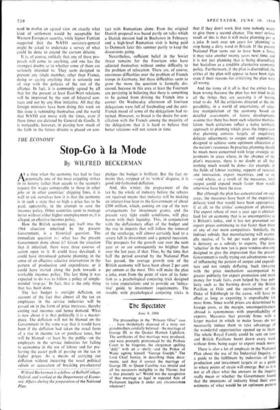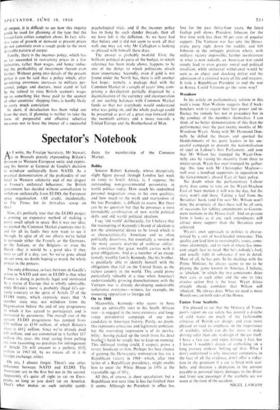THE ECONOMY
Stop-Go a la Mode
By WILFRED BECKERMAN
ATa time when the economy has had to face potentially one of the most crippling strikes in its history rather than accede to the seamen's request for wages comparable to those in other jobs or in other countries' shipping lines, it is well to ask ourselves how it is that the economy is in such a state that so high a price has to be paid, apparently, in the attempt to save the incomes policy. Other countries seem to manage better without either higher unemployment or, it is alleged, an effective incomes policy.
How the British economy got itself into the 1964 situation inherited by the present Government, is a historical question. The immediate question is : what has the present Government done about it? Given the situation that it inherited, there were three courses of action open to it. It could have devalued; it could have introduced genuine planning, in the sense of an effective selective intervention in the pattern of production and expenditure; or it could have started along the path towards a workable incomes policy. The last thing it was expected to do was to follow a policy of simple- minded `stop-go.' In fact, that is the only thing that has been done.
The last budget is outright deflation, on account of the fact that almost all the tax on employees in the service industries will be passed on in the form of price increases, thereby cutting real incomes and hence demand. What is new about it is that politically it is a master- piece. The deflation will not be blamed on the Government in the same way that it would have been if the deflation had taken the usual form of a rise in income tax or purchase taxes, but will be blamed—at least by the public—on the employers in the service industries for failing to economise in the use of labour and for pre- ferring the easier path of passing on the tax in higher prices. As a means of carrying out deflation without incurring the usual political odium or accusation of breaking pre-electoral
Wilfred Beckerman is a fellow of BalliolCollege, Oxford, and worked at the Department of Econo- mic Affairs during the preparation of the National Plan.
pledges the budget is brilliant. But the fact re- mains that, stripped of its `with-it' disguise, it is good old-fashioned deflation.
And, this winter, the prepayment of the tax by the whole of industry before the rebates are received means that industry will be making an interest-free loan to the Government of about £300 million, which, coming on top of the new arrangements for investment grants, and the present very tight credit conditions, will play havoc with their liquidity. This, in conjunction with the deflationary effect of the budget and the rise in imports that will follow the removal of the surcharge, will almost certainly lead to a severe fall in investment and a general recession. The prospects for the growth rate over the next year or so are consequently no brighter than over the last year, if that. Thus, by the time that half the period covered by the National Plan has passed, the average growth rate of the British economy will have been about 2 per cent per annum at the most. This will make the plan a joke, even from the point of view of its func- tion as a psychological conjuring trick designed to raise expectations and to provide an 'indica- tive' guide to investment requirements. The trouble with psychological conjuring tricks is
that if they don't work first time nobody wants to give them a second chance. The most serious result of this is that it will make planning per se a joke. It took over ten years for 'planning' to stop being a dirty word in Britain. If the present National Plan turns out to have been a farce, it may take another twenty years next time, and it is not just planning that is being discredited, but Socialism as a credible alternative economic policy. Furthermore, if the plan is discredited, the critics of the plan will appear to have been right even if their reasons for criticising the plan were all wrong.
And the irony of it all is that the critics have been wrong because the plan has not tried to do all the things they are accusing it of having tried to do. All the criticisms directed at the im- possibility, in a world of uncertainty, of selec- tive manipulation of the economy based on detailed assessments of future developments assume that there has been such selective manipu- lation. Such criticisms reflect a naïve textbook approach to planning which gives the impression that planning consists largely of exquisitely delicate adjustments to output and expenditure designed to achieve some optimum allocation of the nation's resources. In practice, planning should be much more concerned with large strategic ad- justments in areas where, in the absence of the plan's measures, there is no doubt at all that nothing much would be done—for example. in the fields of labour training, support of research and innovation, export incentives, and so on —and where, as a result of the measures, total output could expand much faster than would otherwise have been the case.
But although the plan has concentrated on such areas, the measures have been of the exquisitely delicate kind that would have been appropriate, if at all, to the critics'. conception of planning. The export rebate of over a year ago is chicken- feed for an economy that is as uncompetitive as is Britain's today, and it has not prevented our export prices continuing to rise faster than those of any of- our main competitors. Similarly, the indirect subsidy that manufacturing will eventu- ally receive, of 7s. 6d. per week per employee, is derisory as a subsidy to exports. The term `selective' in the new tax is pure window-dressing designed to give the impression that the present Government is really trying out adventurous ways of influencing the pattern of output and expendi- ture and not simply deflating. Such tinkering with the price mechanism accompanied by greater publicity for export promotion and more money for trade fairs, even helped by free pub- licity such as the burning down of the British Pavilion at Oslo and the recruitment of the Duke of Edinburgh to the cause, will have no effect as long as exporting is unprofitable for most firms. Since world prices are determined by foreign costs, at the margin, uncompetitiveness abroad is synonymous with unprofitability of exports. Measures that provide firms with a larger market in which to make losses do not necessarily induce them to take advantage of the wonderful opportunities opened up to them. The whole Royal Family could be sent on tour and British Pavilions burnt down every week without firms being eager to export much more.
There is also a lot of emphasis in the National Plan about the use of the Industrial Inquiry, as
a guide to the fulfilment by industries of their production and investment targets or as a guide
to where points of strain will emerge. But as it Is not at all clear what the answers to the inquiry really mean or whether the Government found that the intentions of industry fitted their own estimates of what would be an optimum pattern
of output, .it is difficult to see- how this inquiry- could be used for planning of the type that the laissez-faire critics complain about. In fact, rela- tive rates of growth of demand at present prices do not constitute even a rough guide to the most desirable pattern of output.
Finally, there is the incomes policy, which has so far succeeded in restraining prices in a few industries, rather than wages, and hence reduc- ing the profitability of investment therein even further. Without going into details of the present policy it can be said that a policy which, after permitting enormous increases to military per- sonnel, judges and doctors, must stand or fall by the refusal to raise British seamen's_ wages up to something like those paid to the seamen of other countries' shipping lines, is hardly likely to carry much conviction.
In short, if devaluation has been ruled out from the start, if planning is neither to take the form of purposeful and effective selective measures nor to have the impact of a successful
psychological trick, and if the. incomes policy has to hang by such slender threads, then all we have left is the deflation. As we have had that before and it did not seem to work all that well, one may ask why Mr Callaghan is looking so pleased with himself these days.
The answer is probably twofold. First, the brilliant political disguise of the budget, to which reference has been made above, happens to be one of the things to which politicians attach most importance. Secondly, even if gold is not found under the North Sea, there is still another last hope: namely, a package deal with the Common Market in a couple of years' time, com- prising a devaluation partially disguised by a decimalisation of the currency and incorporation of our sterling balances with Common Market funds so that not everybody would understand what was going on, and the whole package could be presented as part of a great step forward into the twentieth century and a move towards a United Europe and the Brotherhood of Man.



































 Previous page
Previous page